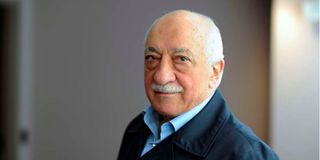Kenya is standing by the controversial repatriation of Turkish refugees sent back to their homeland last week despite protests from their families.
Foreign Affairs PS Korir Sing’oei told an audience of diplomats in Nairobi that Kenya acted so because it did not want Turkey to be seen as hiding subversive elements against Ankara.
In fact, the number was initially seven but three of them were freed with one let off the hook because he held a British passport.
On Sunday, Kenya said it had received a request from Turkey and got assurances the four refugees will be treated fairly.
“The issue of being accused of harbouring subversive elements within your country, who are undertaking activities detrimental to another country is a very serious thing and you cannot ignore it,” Dr Sing’oei explained.
‘Principle of non-interference’
“Now, this is a very difficult dilemma for Kenya and people who think it’s easy have to know that it’s a very difficult dilemma because there are two principles that we hold here.
“But one principle, the principle of non-interference on the internal affairs of another country is a rock-solid principle that goes to the very founding of states.”
Korir did not explain the nature of subversion but the four, Mustafa Genç, Öztürk Uzun, Alparslan Taşçı, and Hüseyin Yeşilsu were residing in Kenya as refugees and had worked for organisations associated with the movement of spiritual leader Fethullah Gulen.
Gulen is accused of plotting a failed coup in Turkey in 2016 but had been living in the US. He died last week, a day after the four were deported to Ankara.

Exiled Turkish Muslim preacher Fethullah Gulen at his residence in Saylorsburg, Pennsylvania. His nephew, identified as Selahaddin Gulen, was abducted in Nairobi on May 3, 2021.
Photo credit: AFP
Yet Korir’s explanation was also a show of inconsistency.
Earlier in December, the Democratic Republic of Congo asked Nairobi to deport three rebel leaders who had launched an alliance in Nairobi ostensibly to take down the government in Kinshasa.
Known as the Congo River Alliance (Alliance Fleuve Congo), it brought together former Congolese National Electoral Commission boss Corneille Yobeluo Nangaa, M23 rebel group president Bertrand Bisimwa and various other armed factions keen to overthrow the Congolese government.
The DRC reacted by recalling its ambassadors to Kenya and the East African Community.
At the time, Prime Cabinet Secretary Musalia Mudavadi, who is also Foreign and Diaspora Affairs Cabinet Secretary said “Kenya strongly disassociates itself from any utterances or activities likely to injure the peace and security of the friendly nation of DRC and has commenced an investigation”.
But President Ruto later admitted he refused to arrest and deport the individuals because their comments were part of free speech.
The Congolese courts have since sentenced them to death in absentia and the US has imposed sanctions on them too.
“DRC wanted to know whether we could arrest those people. I told them: ‘Kenya is a democracy. We cannot arrest anybody who has issued a statement.
“We do not arrest people for making statements, we arrest criminals’. If anybody has committed any criminality, we will go out of our way to deal with them,” Dr Ruto said at the time.
Nairobi’s move last week was, however, also out of Turkey’s rising influence in the Horn of Africa.
Recently, Turkey sold Kenya some policing equipment. They have also marketed security drones to Kenyan security agencies and took several groups to training in Turkey.
Overall, Turkey has risen on the continent, more than tripling its diplomatic missions from 12 in the early 2000s to 44. They have the largest embassy in Africa in Somalia, where they also have a military training base for Somali national forces.
Dr Sing’oei did allude to this influence.
“And the state in question, namely Turkey, is a big player now in the region as you know. It is involved in Somalia, it’s involved in Ethiopia, it’s involved around our neighborhood. And so when you view a matter of this nature from a peace and security lens, you can see the dilemma that sometimes we’re confronted with.”
Critics have accused Kenya of abandoning an age-old principle in refugee protection.
Under the 1951 Refugee Convention and various African Union and local laws, refugees cannot be sent back to a place they flee from unless they agree to. The exception may be if the refugees are a risk to national security or been involved in serious crime. However, some activists say Kenya should have sent them to a third country instead.
“Sometimes, you know, that is consistent with principle. Sometimes we may take a position that appears completely out of tandem with principle,” Sing’oei explained.
“I just want to reiterate that this does not dilute our humanitarian ethos and our firm belief that those fleeing persecution, those fleeing conflicts are welcome, are welcome to our country,” he said.





